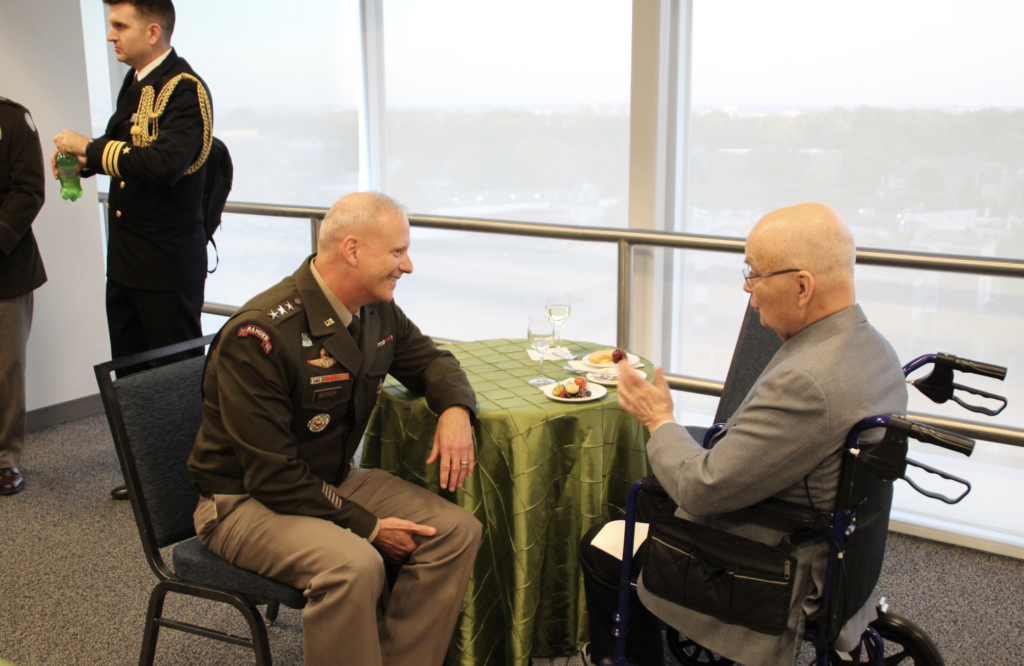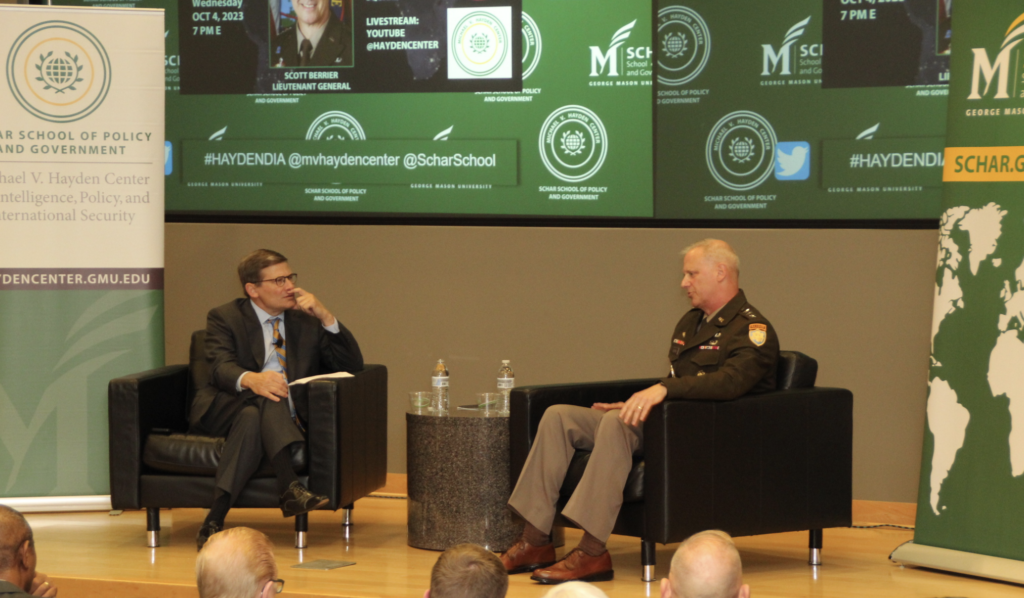ADELINE SIEBENTHAL
On October 4th, 2023, the Michael V. Hayden Center for Intelligence, Policy, and International Security welcomed Lieutenant General Scott Berrier, Director of the Defense Intelligence Agency (DIA), for an exclusive interview with Michael Morell, former Acting and Deputy Director of the Central Intelligence Agency, and Hayden Center fellow. George Mason University’s ROTC Color Guard opened the event with a presentation of the colors to The Star Spangled Banner. Mark Rozell, Dean of the Schar School at George Mason University, and Laurence Pfeiffer, Director of the Michael V. Hayden Center, made opening remarks. Morell and the audience posed questions on many topics related to current security threats, intelligence, and General Berrier’s long and impactful career.
General Berrier’s first response was seemingly a full circle moment, in which he reflected on his first gig as an infantryman in Alaska in 1984. General Berrier compared the threat landscape in 1984 versus today, noting that today, the threat and its complexity are much greater. Continuing with discussing General Berrier’s career, Morell asked, “As you think about your career, could you share the experiences or moments that shaped who you are and your success?” General Berrier responded that early in his career, he was part of an elite unit that underwent difficult training under demanding circumstances, and that experience established the foundation for the officer he would become. Additionally, General Berrier noted how throughout his career, he would chase the hard jobs all while honing his intelligence and leadership skillset. Later, an audience member asked General Berrier what qualities he thinks someone of exceptional character possesses. General Berrier responded that being a great listener, having empathy when speaking to others, and being able to communicate are top qualities, and how these qualities are ideal for becoming an inspirational leader.
Morell invited General Berrier to discuss the DIA and its role within the Intelligence Community (IC). General Berrier noted that the DIA, one of 18 intelligence agencies, conducts all-source intelligence and operations. He continued, noting that the DIA conducts analysis on all domains, has a presence in 140 countries, and at its core, is there to provide foundational military intelligence. General Berrier emphasized the asymmetrical advantage to the US IC, with IC leadership knowing one another and working well together. General Berrier discussed the robust private sector partnerships the DIA has, ranging from academia to technology firms, that promote innovation. He later discussed how the DIA leverages its private sector technology partnerships to manage its data better while machine learning revolutionizes the way the DIA conducts foundational military intelligence.
General Berrier then provided Morell and the audience with a short analysis of China today, first noting, “When I think about China, I do not want to oversimplify it because it is a complex ecosystem.” General Berrier discussed China in four parts: how Xi Jinping’s political strategy has positioned him to be the top decision maker in nearly all spheres; how the Belt and Road Initiative, which acts as the economic engine driving investment throughout the global, and for some time fueled the Chinese economy, seems to be tapering off right now; how China’s militarization and public projections for taking Taiwan by force have impacted the DIA; and how all of these discussion points are covered in a sheath of espionage and have produced the most significant theft of intellectual property in history.
On the topic of the Russian war on Ukraine, General Berrier commented that while Ukraine is giving more than getting in this war, they have the asymmetrical advantage of having global support. He continued, noting that the US continues to provide Ukraine with intelligence. Regarding how this war may end, General Berrier commented that while he is not quite sure whether it will be solved on the battleground or through diplomacy, the US will watch carefully and continue supporting Ukraine as long as it takes.
Continuing the discussion on current security threats, Morell asked General Berrier, “How does the DIA think about Iran?” General Berrier commented that the Iranian threat is still very real; they have a credible ballistic missile force, have provided Russia with UAV technology, and that Iran is a credible threat. Morell and General Berrier also briefly discussed North Korea, how its military has eroded over time, and how General Berrier no longer sees North Korea as a credible threat.
In closing, General Berrier gave a DIA recruitment pitch to the audience noting that the first thing that comes to mind when he thinks of DIA is “serve.” He noted that the DIA provides a unique atmosphere as it meshes the armed forces with the intelligence field. The staff gets to work with the military in ways they may not experience if they worked for other agencies. He concluded, noting that the DIA provides top-notch training, but in return, they will expect you to be excellent every single day. The event concluded with audience questions and a complementary reception for in-person attendees.
A video of the event is available at the Hayden Center YouTube channel: https://www.youtube.com/watch?v=4Q9li16O3dg&t=2s
Adeline Siebenthal is a student in the Masters in International Security program at the George Mason University Schar School of Policy and Government. While at George Mason, she works as the Graduate Assistant for The Michael V. Hayden Center.


